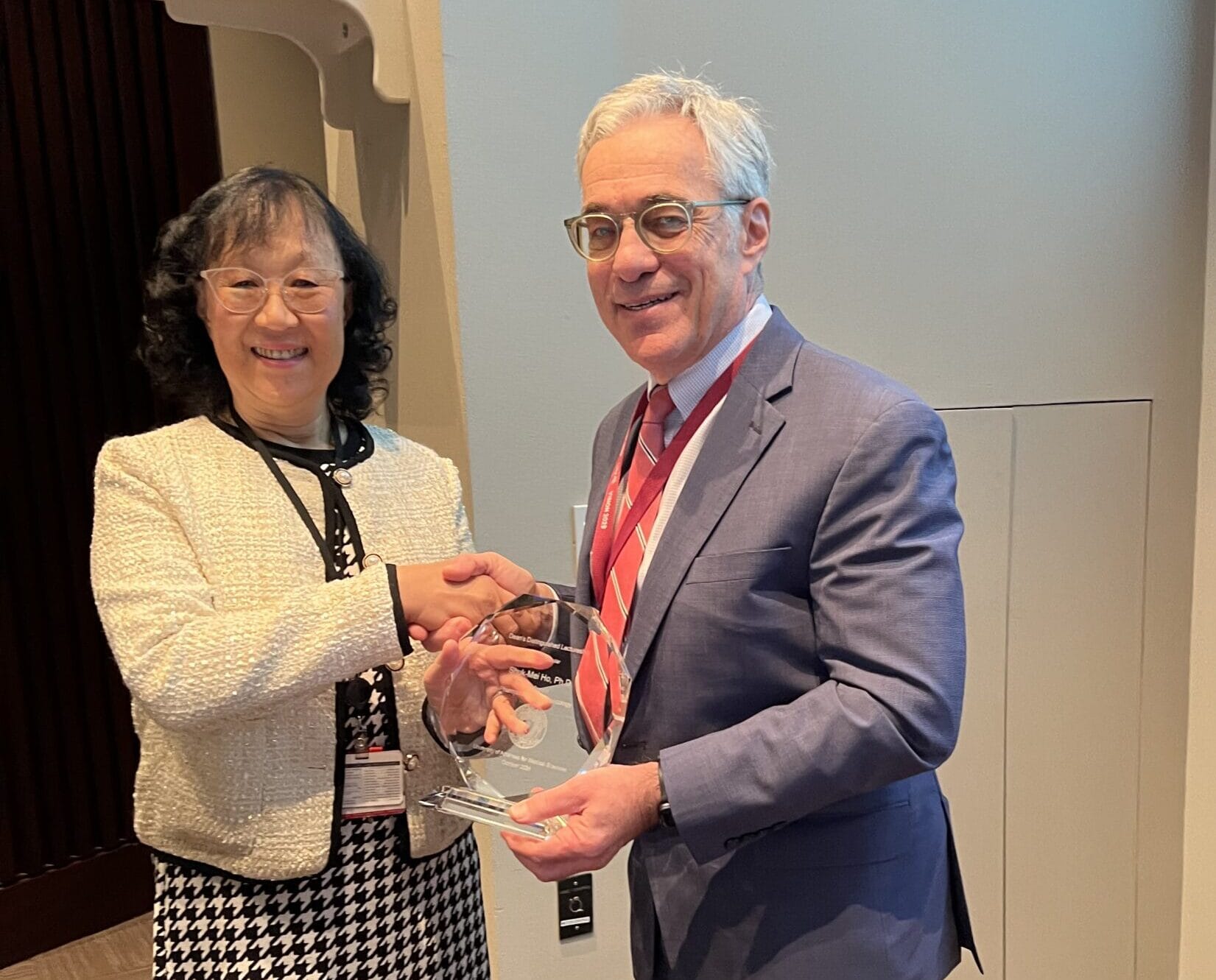UAMS College of Medicine Honors Shuk-Mei Ho, Ph.D., as Distinguished Faculty Scholar
| Shuk-Mei Ho, Ph.D., has earned international recognition for her pioneering research in oncology, toxicology and epigenetics, and accolades for her leadership in research more broadly. But as she was being honored by the University of Arkansas for Medical Sciences (UAMS) College of Medicine as the 2024 Distinguished Faculty Scholar, she emphasized the central role of teamwork in successful research programs.
“None of this is my accomplishment; this is a collective effort,” said Ho, a professor in the College of Medicine’s Department of Pharmacology and Toxicology and the UAMS College of Public Health’s Department of Environmental Health Sciences. She also served as UAMS vice chancellor for research and innovation from 2019 to April 2024.
After discussing studies from her lab and others focusing on the interplay between genetics, chemicals that are ubiquitous in today’s world, and even diet, in cancer, Ho concluded her Oct. 9 talk with more words of appreciation for faculty colleagues, lab members, and the more than 80 trainees she has mentored over her 35-year career.
“Research is a concerted effort,” she said. “It is teamwork, and it is the (team) environment. It is you. … I am very grateful to accept this award.”
College of Medicine Dean and UAMS Executive Vice Chancellor Steven Webber, M.D., highlighted some of Ho’s key accomplishments while presenting her with the Distinguished Faculty Scholar Award.
“Under Dr. Ho’s leadership as vice chancellor, research funding nearly doubled at UAMS, rising from approximately $81 million in Fiscal Year 2019 to $176 million this past academic year,” Webber said. “Her efforts have really elevated UAMS’ national profile and our national rankings.”
As a cancer researcher, Ho has secured more than $58 million in funding from the National Institutes of Health along with funding from the U.S. Department of Defense, U.S. Department of Veterans Affairs and the National Science Foundation. She has authored nearly 260 peer-reviewed publications, placing her among the top 2% of scientific authors worldwide. Her national accolades include the 2020 Society of Toxicology Distinguished Toxicology Scholar Award.
Before her recruitment to UAMS, Ho served for more than 14 years at the University of Cincinnati Medical Center, where her leadership roles included chair of the Department of Environmental Health and co-founder and inaugural director of the Cincinnati Cancer Center. She held earlier faculty positions at the University of Massachusetts Medical School, Tufts University and Boston University.
Ho was nominated for the UAMS College of Medicine honor by Michael Birrer, M.D., Ph.D., vice chancellor and director of the Winthrop P. Rockefeller Cancer Institute.
“Dr. Ho has been at the forefront of innovative research, focusing on the role of hormones and endocrine-disrupting compounds in disease development including cancer, asthma, and immune-related diseases,” Birrer said in his nomination letter. “Her expertise in environmental epigenetics and epigenetic epidemiology has positioned her as a leader in the field, with groundbreaking discoveries that have significantly impacted public health policy and consumer behavior.”
In her talk, Ho focused extensively on the role of the endocrine-disrupting compound (EDC) bisphenol A (BPA) in various cancers and health. BPA is found in many plastic and resin products such as water bottles, the lining of food cans, and the thermal paper used in cash register receipts. Significantly, BPA and other EDCs increase susceptibility to cancer and other diseases at extremely low doses.
“Bisphenol A is ubiquitous; it is everywhere in the environment,” Ho emphasized while discussing one of her team’s studies into the combined effects of low levels BPA and a diet high in butterfat in the development of mammary cancer.
Ho’s team went to great lengths to create a BPA-free laboratory environment, including the use of air and water filtration and personal protective equipment (PPE) for lab members entering the facility. “It was 25 people on shifts every day for a year and a half,” she said. “We wore PPE so that none of our clothes or perspiration would introduce Bisphenol A.”
Ho’s research has shed light on numerous cancers, including prostate, endometrial and breast cancer. The studies have examined the effects of exposure to toxins at various “windows of susceptibility” throughout life including the periods of in utero before birth, neonatal, puberty and aging. Ho and colleagues have also advanced knowledge of the transgenerational effects of exposure to BPAs, other toxins and hormone medications.
